- Home
- Gore Vidal
Death Before Bedtime Page 5
Death Before Bedtime Read online
Page 5
Verbena Pruitt was the first to leave and, from the grim look on her face, I was quite sure that she would be in touch with the White House before many minutes had passed: after all she was, in a sense, The American Woman. Mr. Pomeroy murmured something to his wife and also left. Walter Langdon went upstairs and Rufus Hollister tangled with the Lieutenant in my presence.
“Lieutenant, you must let me get certain papers out of the Senator’s file. It’s extremely urgent, as I’ve said before.”
“I’m sorry, Mr. Hollister, but those papers are all being gone over by the Department. There’s nothing I can do about it.”
“I don’t think you realize how serious this is, Lieutenant,” said Hollister, flushing angrily. “The papers I want have nothing to do with the murder … I swear to you they don’t. They involve, however, certain people of the greatest importance—the leaders of this country—and they were meant only for the Senator’s eyes.”
“We’re not politicians,” said the Lieutenant quietly … a little inaccurately, I thought. “We’re not interested in the political implications of all this. Those papers are being gone over by men who are looking for only one thing: clues to the murder of Senator Rhodes. I don’t need to tell you that they are discreet men. In any case, all the papers will be returned to your office in a day or two.”
“You don’t understand,” said Rufus furiously, but there was very little he could say: the Lieutenant’s attitude was perfectly reasonable, and legal. “I shall talk to the District Commissioners about this,” he said, finally; then he was gone. The Lieutenant sighed. I looked about me and saw that we were the only two left in the room. Ellen had quietly vanished … in pursuit of Walter Langdon, I presumed. The other policemen were all upstairs in the study. In the dining room behind us, the servants were cleaning up.
“You’ve got your work cut out for you,” I said sympathetically.
He nodded. “It’s like doing a tightrope act. Do you realize the influence this gang has? I don’t dare offend any of them.”
“Or dare make a mistake.”
“We don’t make mistakes,” said the Lieutenant, suddenly stuffy, a policeman after all in spite of his college manners and Grecian profile.
“I might be able to help you,” I said, going off on another tack: one which would interest him. He didn’t react quite the way I would have liked, though.
“Why do you want to do that?” He was suspicious. It gave me quite a turn to realize that this man regarded me as a possible murderer.
“Money,” I said callously. Self-interest makes beasts of us all … and all men understand self-interest: it is the most plausible of motives, the one which is seldom ever questioned.
“What do you mean?”
“I mean that I would like very much to be the first to know who did the murder because I could then get quite a large sum of money from my old newspaper the New York Globe for an exclusive story on the murder.”
“I thought you were in public relations.”
“Before that I was assistant drama critic on the Globe. You may recall I was the one who did the story on the murder of Ella Sutton, the ballerina, last year. I made a good deal out of that particular story.”
“I remember.” I couldn’t tell how he was reacting. Then: “Just how do you think you can help us?”
“Through the family,” I said glibly. “Through Ellen Rhodes. You see we used to be engaged. I can find out quickly a lot of things you people might never know.”
“Such as?”
“What’s really going on. What the Senator’s true relationships were with this gang. By an odd coincidence almost everyone here disliked him, or had reason to.”
“Except you?”
I was getting nowhere; I was also getting rather put out with this decorative arm of the law. “Except me. No, I didn’t murder the old goat so that I could marry his daughter and get all his money. Having sat next to her at lunch you are probably quite aware of Miss Rhodes’ true nature.”
Against his will, the Lieutenant grinned. I had made a chink in the official mask. I charged ahead. “We’re old friends, that’s all, Ellen and I. I have a hunch she knows a good deal about this and I can find out what she knows, quickly.”
“All just for a newspaper story?”
“Just!” I was genuinely outraged. “Yes,” I said, more calmly, “just for a newspaper story, for the money and the publicity.”
“We’re not supposed to work with the press … not like this, at this stage of an investigation.”
“On the other hand, I’m not just the press either.”
“I’ll say you’re not. You’re a murder suspect.”
This was putting it too coldly, I thought. I shrugged and turned away, “In that case, you’ll get no coöperation from me, Lieutenant. What I do know I’ll keep to myself.”
“What’s the deal?” He was abrupt.
“I want to know what’s going on. In exchange I’ll find out things for you … family skeletons. On top of that, remember the pieces I’ll do for the Globe’ll be widely reprinted and you, Lieutenant Winters, will be getting a good deal of attention.”
“What do you know?” I had won the first round.
“Pomeroy,” I said. There was no need to explain further: we understood each other.
“Why Pomeroy?”
“Old enemy. The Senator was blackmailing him over that 5-X … at least that’s my guess. Rhodes wanted to be paid off either in cash or votes, probably the last. Pomeroy’s a big gun in their state.”
“How did you find this out?”
“I know a little about politics,” I said quietly; as a matter of fact I had figured out the whole plot at lunch. I didn’t care to admit, at this point however, that I was relying rather heavily on intuition and a few chance remarks dropped my way the day before by Rufus Hollister.
The Lieutenant extended to me his first confidence. “That’s one way of looking at it,” he said. “But the fact is the Senator refused yesterday to recommend Pomeroy to the Defense Department … Pomeroy admitted as much.”
“I wonder, though, why the Senator’s recommendation should be so important?” I asked, a little puzzled.
“Pomeroy was in bad with the Defense Department. They canceled his contract last month.”
I nodded as if I knew all this; actually it was a surprise; the first real lead. “I knew,” I lied, “that he hoped his 5-X would put him back into business again.”
“It’s not very clear, though,” said the Lieutenant sadly, moving over to the window which overlooked the street. Several newspapermen were trying to get past the guards. Most of the crowd, however, had gone on about their business. “Why would Pomeroy want to kill the one man who could help him get his contract?”
“Isn’t revenge one of the usual motives? along with greed and lust?”
“It’s a little extreme … and obvious, too obvious.” It was the first time that I had ever heard a member of any police department maintain that anything was too obvious: as a rule they jump wildly, and often safely, to the first solution that offers itself. This was a bright boy, I decided; I would have to handle myself very carefully around him.
“One other thing,” I said, playing my only card.
“What’s that?”
“Mrs. Pomeroy. I have an idea, a hunch.”
“That what?”
“That she and the old boy were carrying on, a long time ago. It would complete the revenge motive wouldn’t it? Not only was Pomeroy angry about losing his contract but he also had an old grudge against the Senator because of something which had happened even before Pomeroy ever met his wife.”
“Where’d you find all this out?”
“Deduction, I’m afraid. No evidence. At lunch today she made several remarks which started me thinking, that’s all. I found out that she’d known the Senator all her life, that she was very fond of him … really so … that Pomeroy, as we know, was not; that Pomeroy came to the state only about fifteen
years ago from Michigan and about the same time, married the Senator’s old friend, Mrs. P.”
“It’ll take a good deal of investigating to check on this.”
“I know some short cuts.”
“We could use them.”
“You do think Pomeroy killed the Senator, don’t you?”
The Lieutenant nodded, “I think he did.”
3
After my session with Winters, I went upstairs and telephoned my office in New York. My secretary, a noble woman in middle life named Miss Flynn, admitted that she had been concerned about me. She gave me a quick report on the progress of my other clients: a hat company, three television actresses of the second rank, a comedian of the first rank, a society lady of mysterious origin but well-charted future, and a small but rich dog-food concern. All of my clients seemed reasonably pleased and the few problems which had arisen in my absence were settled over the phone with Miss Flynn. “I trust you will soon return to New York now that your client Senator Rhodes has been Gathered Up,” said Miss Flynn ceremoniously.
“As soon as the police let us go,” I said. “We’re all in quite a spot.”
“Washington!” said Miss Flynn with a note of disgust: next to Hollywood she regarded it as the end, the absolute moral end of a country which was rapidly degenerating into something Roman and horrid.
After I had finished with Miss Flynn, I called my old editor at the Globe and I managed to extort a considerable sum for a series of articles on the death of Senator Rhodes. I need not now recall the details of this transaction; enough to say that I did pretty well, considering the depressed state of the dollar.
My business over, I strolled downstairs to the second floor. At one end of the corridor, on the left, was the blanketed and guarded entrance to the study. Three bedrooms opened off that corridor. The one nearest the study was occupied by the Pomeroys. Across from it was Walter Langdon’s and, next to his, was Rufus Hollister’s room. To the right of the landing was another hall with four bedrooms opening off it. They were the rooms, I knew, of Senator Rhodes, of Mrs. Rhodes, of Ellen and Miss Pruitt. My room on the third floor was definitely in the outfield, up where the servants lived. On an impulse I went to Ellen’s room and opened the door, without knocking.
Had I been half an hour later, I should probably have witnessed as fine a display of carnality as our Puritan country has to offer; happily, for my own modesty, I found Walter Langdon and Ellen still clothed in spite of a steaming embrace on the bed which broke abruptly when they heard me. Langdon leaped to his feet like a track star warming up for the high hurdles; Ellen, an old hand at this sort of discovery, sat up more slowly and straightened her hair. “A pin just stabbed me in the back of the neck,” she announced irritably, rubbing her neck. “Why the hell don’t you knock?” Then, before I could answer she turned to Langdon angrily and said, “I thought you said you locked the door?”
“I … I thought I did. I guess I turned the key over in the lock.” He was blushing furiously and I could see that my ex-fiancé had aroused him. Embarrassed he trotted into the bathroom and slammed the door behind him.
“A cooling-off period at this point in an affair is often considered very sound,” I said smoothly. “It gives both parties an opportunity to determine whether or not their needs can be served only through sin.”
“Oh, shut up! Where do you think you are? in a railroad station? We were just talking, that’s all … and now look what you’ve done.”
“What have I done?”
“Embarrassed the poor little thing to death. It may take me days to get him back to where I had him before you came in.”
“He’s not that much of a baby,” I said. “And your methods are foolproof anyway.”
“Hell!” said Ellen, in a mood of complete disgust and dejection.
“Anyway I want to talk to you.”
“What about?”
Before I could answer, Langdon came back into the bedroom noticeably soothed. “I’ll see you later,” he said calmly and left the room.
“Now look what you’ve done!”
“You can finish your dirty work tonight,” I said. “I want to talk to you about the murder.”
“Well, what about it?” She was still angry. She went over to her dressing table and sat down, repairing her blurred make-up. I ambled about the room, looking at the bookcase full of girls’ stories and passionate adult novels, at the rather unfeminine décor.
“Was this always your room?”
She nodded. “Up until I got married it was.”
“Where did you go after the marriage was annulled?”
“To a finishing school in New York. When I was thrown out of that, I stayed in New York.…”
“On a liberal allowance.”
“Depends on your idea of liberal; now what about the murder?”
“They think, the police think, Pomeroy did it?”
“So?”
“Did he?”
“How should I know? Why don’t you ask him?”
“I thought you said you knew who did it.”
She laughed, “Did I say that? I must’ve been lit … or maybe you were lit … which reminds me will you push that bell over there. It’s getting near teatime and I’m developing that funny parched feeling.” I pushed the mother-of-pearl button.
“Who do you think did it?”
“My darling Peter, I’m not sure that even if I did know I would tell you. I realize that’s an unnatural way to feel about the murderer of your own father but I’m not a very natural girl, as you well know … or maybe too natural, which is about the same thing. If somebody disliked Father enough to kill him I’m not at all sure that I would interfere. I have no feeling at all about him, about my father I mean. I never forgave him for that annulment … not that I was so much in love, though I thought I was, being young and silly, but rather because he had tried to interfere with me and that’s one thing I can’t stand. Anyway he was not very lovable, as you probably gathered, and when I could get away from home I did. I still don’t know what on earth prompted me to come down here with you. I guess I was awfully high at Cambridge and it seemed like a fun idea. I regretted the whole thing the second I woke up on that train but it was too late to go back.” The butler interrupted the first serious talk I had ever had with Ellen and, by the time half a Scotch mist had given her strength to face the afternoon, she was herself again and our serious moment was over.
“What do you know about the Pomeroys?” I asked when the butler had disappeared.
“What everybody knows. They’re not that mysterious. He came to Talisman City in the late Thirties and set up a factory … I suppose he had some capital to start with … he manufactured explosives. When the war came along he made a lot of money and the factory grew very big and he grew with it, got to be quite a power politically. Then the war ended, business fell off and he lost his contract with the government, or so I was told yesterday.”
“By whom?”
“By my father.” She paused thoughtfully; then she swallowed the rest of the Scotch.
“Did he … did your father seem nervous to you?”
“You know, Peter, you’re beginning to sound like that police Lieutenant … only not as pretty.”
“I’ve got a job to do,” I said, and I explained to her about the Globe, told her that she had to help me, that I needed someone who could give me the necessary facts about the people involved.
“You’re an awfully fast operator,” she said.
“That makes two of us.”
She laughed; then she sat down beside me on the couch. “I’m afraid I’ve been away too long to be much help … besides, you know what I think or rather what I don’t think about politics.”
“I have a hunch that the murder doesn’t have anything to do with politics.”
“Your guess is as good as anybody’s,” said Ellen and she helped herself to another drink.
“What about Mrs. Pomeroy?”
“What abou
t her?”
“What’s her relationship to your family … I gather she knew the Senator before she married Pomeroy.”
“That’s right. I remember her as a child … when I was a child, that is. She’s about twenty years older than I am, though I’m sure she’d never admit that, even to her plastic surgeon.”
“Plastic surgeon?”
“Yes, darling; she’s had her face lifted … don’t you know about those things? There are two little scars near her ears, under the hair.…”
“How was I supposed to see those?”
“I noticed them; I know all about those things. But that’s beside the point. She’s been around ever since I can remember. Her family were very close to ours … used to live right down the street, as a matter of fact: she was always coming over for dinner and things like that … usually alone. Her father was an undertaker and not very agreeable. Her mother didn’t get on very well with my mother so we seldom saw much of her.…”
“Just the daughter?”
“Yes, just Camilla. She was always organizing the Young People’s Voter Association for Father, things like that. She used to be quite a bug on politics, until she married Roger. After that we saw less of her … I suppose because Roger didn’t get on with Father.”
“I’ve got a theory that Mrs. Pomeroy and the Senator were having an affair.”
Ellen looked quite startled; then she laughed. “Well, I’ll be damned,” she said. “Now that is an idea.”
“Well, what’s wrong with it?” I don’t like my intuitions to be discredited so scornfully.
“Well, I don’t know … it just seems terribly unlikely. Father was never interested in women … as far as I know. She might have had a crush on him: that often happened when he was younger. There was always some dedicated young woman around the house doing odd jobs, but I’m sure nothing ever happened. Mother always kept a sharp eye on Father.”
“I still think something might have happened.”
“Well, what if it did?”

 The Golden Age: A Novel
The Golden Age: A Novel Death Before Bedtime
Death Before Bedtime Burr
Burr The Last Empire
The Last Empire Empire: A Novel
Empire: A Novel The Selected Essays of Gore Vidal
The Selected Essays of Gore Vidal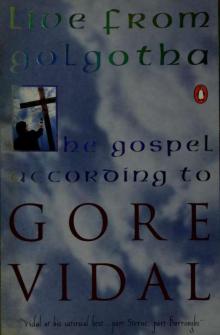 Live From Golgotha
Live From Golgotha Lincoln
Lincoln Death Likes It Hot
Death Likes It Hot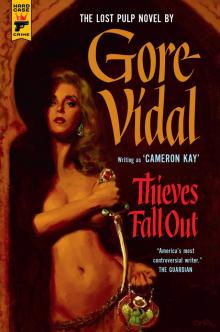 Thieves Fall Out (Hard Case Crime)
Thieves Fall Out (Hard Case Crime) Point to Point Navigation
Point to Point Navigation Williwaw
Williwaw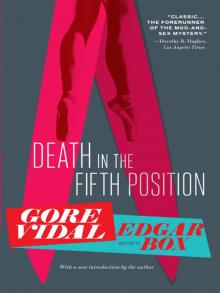 Death in the Fifth Position
Death in the Fifth Position In a Yellow Wood
In a Yellow Wood Julian
Julian Hollywood
Hollywood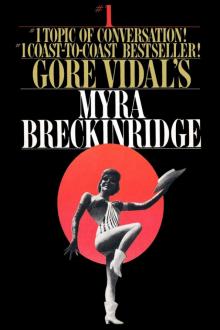 Myra Breckinridge
Myra Breckinridge Messiah
Messiah The Second American Revolution and Other Essays 1976--1982
The Second American Revolution and Other Essays 1976--1982 Homage to Daniel Shays
Homage to Daniel Shays Empire
Empire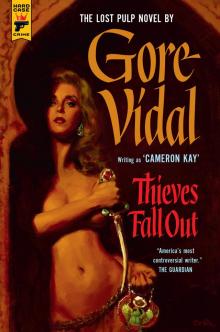 Thieves Fall Out
Thieves Fall Out 1876
1876 The City and the Pillar
The City and the Pillar The Golden Age
The Golden Age At Home
At Home